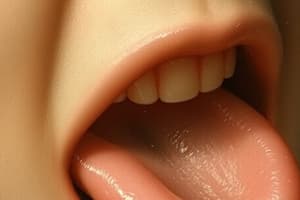Podcast
Questions and Answers
What structure begins to develop around the 4th week of gestation and is crucial for tongue formation?
What structure begins to develop around the 4th week of gestation and is crucial for tongue formation?
- Tongue buds
- Hypobranchial eminence
- Tuberculum impar (correct)
- Lateral lingual swellings
Which cranial nerve provides sensory innervation to the anterior 2/3 of the tongue?
Which cranial nerve provides sensory innervation to the anterior 2/3 of the tongue?
- VII cranial nerve
- IX cranial nerve
- X cranial nerve
- V cranial nerve (correct)
The posterior 3rd of the tongue develops from which structure derived from the mesoderm?
The posterior 3rd of the tongue develops from which structure derived from the mesoderm?
- Hypobranchial eminence (correct)
- Tuberculum impar
- Epiglottis
- Lateral lingual swellings
Which cranial nerve is responsible for the sensory innervation of the posterior part of the tongue?
Which cranial nerve is responsible for the sensory innervation of the posterior part of the tongue?
What is the primary origin of the connective tissue and vasculature of the tongue?
What is the primary origin of the connective tissue and vasculature of the tongue?
What is the condition characterized by the congenital absence of the tongue?
What is the condition characterized by the congenital absence of the tongue?
Which of the following structures is primarily responsible for the formation of the anterior part of the tongue?
Which of the following structures is primarily responsible for the formation of the anterior part of the tongue?
At which gestational week do the lateral lingual swellings begin to grow?
At which gestational week do the lateral lingual swellings begin to grow?
Which cranial nerve is primarily responsible for innervating the muscle components of the tongue?
Which cranial nerve is primarily responsible for innervating the muscle components of the tongue?
Which part of the tongue is influenced by the 4th pharyngeal arch during its development?
Which part of the tongue is influenced by the 4th pharyngeal arch during its development?
What condition is characterized by an abnormally small tongue leading to limited muscular movement?
What condition is characterized by an abnormally small tongue leading to limited muscular movement?
The failure of lateral swellings to merge during development results in which condition?
The failure of lateral swellings to merge during development results in which condition?
Ankyloglossia is commonly referred to as what?
Ankyloglossia is commonly referred to as what?
Macroglossia is often associated with which congenital defect syndrome?
Macroglossia is often associated with which congenital defect syndrome?
Which of the following describes the failure in cellular degeneration leading to tongue anchorage to the floor of the mouth?
Which of the following describes the failure in cellular degeneration leading to tongue anchorage to the floor of the mouth?
Which of the following is TRUE about microglossia?
Which of the following is TRUE about microglossia?
Flashcards
What is the tongue?
What is the tongue?
A muscular organ in the oral cavity used for taste and swallowing.
What is the tuberculum impar?
What is the tuberculum impar?
The first pharyngeal arch swelling that contributes to tongue development.
What are the lateral lingual swellings?
What are the lateral lingual swellings?
Form the anterior two-thirds of the tongue.
Innervation of the anterior tongue
Innervation of the anterior tongue
Signup and view all the flashcards
What is the hypobranchial eminence (copula)?
What is the hypobranchial eminence (copula)?
Signup and view all the flashcards
Innervation of the posterior tongue
Innervation of the posterior tongue
Signup and view all the flashcards
Innervation of the epiglottis region
Innervation of the epiglottis region
Signup and view all the flashcards
What is aglossia?
What is aglossia?
Signup and view all the flashcards
What is microglossia/hypoglossia?
What is microglossia/hypoglossia?
Signup and view all the flashcards
What is macroglossia?
What is macroglossia?
Signup and view all the flashcards
What is ankyloglossia?
What is ankyloglossia?
Signup and view all the flashcards
Innervation of tongue muscles?
Innervation of tongue muscles?
Signup and view all the flashcards
What is the Origin of tongue muscles?
What is the Origin of tongue muscles?
Signup and view all the flashcards
What causes a cleft tongue (bifid tongue)?
What causes a cleft tongue (bifid tongue)?
Signup and view all the flashcards
Study Notes
Development of the Tongue
- The tongue is a muscular organ located in the oral cavity, vital for taste and initial swallowing.
- Development begins around the 4th week of gestation with a medial swelling from the 1st pharyngeal arch called the tuberculum impar.
- By the 5th week, two lateral lingual swellings from the same arch grow, merge, and overlap the tuberculum impar, forming the anterior two-thirds of the tongue.
- The anterior tongue receives sensory innervation from the mandibular branch of the trigeminal nerve (V cranial nerve).
Formation of the Posterior Tongue
- The posterior third of the tongue arises from a median swelling known as the hypobranchial eminence (or copula) originating from the 2nd, 3rd, and 4th pharyngeal arches.
- This area gets sensory innervation from the glossopharyngeal nerve (IX cranial nerve).
- The posterior-most tongue region, associated with the epiglottis, develops from the 4th pharyngeal arch and is innervated by the superior laryngeal nerve.
Musculature of the Tongue
- The connective tissue and blood vessels of the tongue derive from cranial neural crest cells (CNCC).
- Myoblasts responsible for tongue muscles originate from occipital somites, migrating into the tongue primordium.
- Muscle cells receive innervation primarily from the hypoglossal nerve (XII cranial nerve), except for the palatoglossus muscle.
Tongue Anomalies
- Aglossia: Rare congenital absence of the tongue, typically due to severe maldevelopment of the first pharyngeal arches.
- Microglossia (Hypoglossia): An uncommon condition characterized by an abnormally small tongue, leading to restricted muscular movement.
- Macroglossia: Tongue enlargement often associated with congenital syndromes like Down syndrome (trisomy 21).
- Ankyloglossia: Condition resulting from insufficient cellular degeneration, causing an abnormally short lingual frenulum and restricted tongue movement; can range from mild to severe fusion.
- Cleft Tongue (Bifid Tongue): Occurs when lateral swellings fail to merge, leading to a split tongue; can be either partial or complete.
Studying That Suits You
Use AI to generate personalized quizzes and flashcards to suit your learning preferences.




